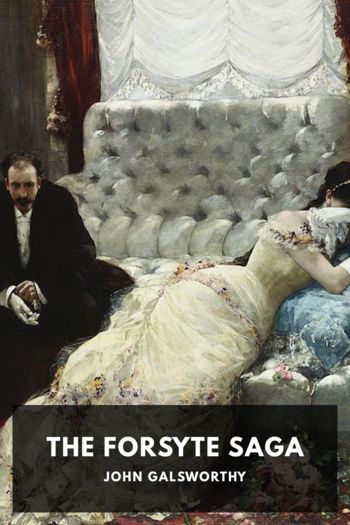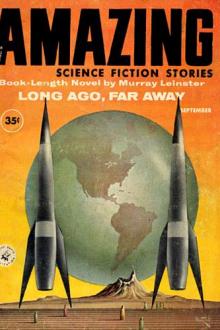The Forsyte Saga - John Galsworthy (best english novels for beginners .txt) 📗

- Author: John Galsworthy
Book online «The Forsyte Saga - John Galsworthy (best english novels for beginners .txt) 📗». Author John Galsworthy
“It’s cruel,” thought Fleur, “and I was glad! That man! What do men come prowling for, disturbing everything! I suppose he’s tired of her. What business has he to be tired of my mother? What business!” And at that thought, so natural and so peculiar, she uttered a little choked laugh.
She ought, of course, to be delighted, but what was there to be delighted at? Her father didn’t really care! Her mother did, perhaps? She entered the orchard, and sat down under a cherry-tree. A breeze sighed in the higher boughs; the sky seen through their green was very blue and very white in cloud—those heavy white clouds almost always present in river landscape. Bees, sheltering out of the wind, hummed softly, and over the lush grass fell the thick shade from those fruit-trees planted by her father five-and-twenty years ago. Birds were almost silent, the cuckoos had ceased to sing, but wood-pigeons were cooing. The breath and drone and cooing of high summer were not for long a sedative to her excited nerves. Crouched over her knees she began to scheme. Her father must be made to back her up. Why should he mind so long as she was happy? She had not lived for nearly nineteen years without knowing that her future was all he really cared about. She had, then, only to convince him that her future could not be happy without Jon. He thought it a mad fancy. How foolish the old were, thinking they could tell what the young felt! Had not he confessed that he—when young—had loved with a grand passion? He ought to understand! “He piles up his money for me,” she thought; “but what’s the use, if I’m not going to be happy?” Money, and all it bought, did not bring happiness. Love only brought that. The ox-eyed daisies in this orchard, which gave it such a moony look sometimes, grew wild and happy, and had their hour. “They oughtn’t to have called me Fleur,” she mused, “if they didn’t mean me to have my hour, and be happy while it lasts.” Nothing real stood in the way, like poverty, or disease—sentiment only, a ghost from the unhappy past! Jon was right. They wouldn’t let you live, these old people! They made mistakes, committed crimes, and wanted their children to go on paying! The breeze died away; midges began to bite. She got up, plucked a piece of honeysuckle, and went in.
It was hot that night. Both she and her mother had put on thin, pale low frocks. The dinner flowers were pale. Fleur was struck with the pale look of everything; her father’s face, her mother’s shoulders; the pale panelled walls, the pale grey velvety carpet, the lampshade, even the soup was pale. There was not one spot of colour in the room, not even wine in the pale glasses, for no one drank it. What was not pale was black—her father’s clothes, the butler’s clothes, her retriever stretched out exhausted in the window, the curtains black with a cream pattern. A moth came in, and that was pale. And silent was that half-mourning dinner in the heat.
Her father called her back as she was following her mother out.
She sat down beside him at the table, and, unpinning the pale honeysuckle, put it to her nose.
“I’ve been thinking,” he said.
“Yes, dear?”
“It’s extremely painful for me to talk, but there’s no help for it. I don’t know if you understand how much you are to me—I’ve never spoken of it, I didn’t think it necessary; but—but you’re everything. Your mother—” he paused, staring at his finger-bowl of Venetian glass.
“Yes?”
“I’ve only you to look to. I’ve never had—never wanted anything else, since you were born.”
“I know,” Fleur murmured.
Soames moistened his lips.
“You may think this a matter I can smooth over and arrange for you. You’re mistaken. I’m helpless.”
Fleur did not speak.
“Quite apart from my own feelings,” went on Soames with more resolution, “those two are not amenable to anything I can say. They—they hate me, as people always hate those whom they have injured.”
“But he—Jon—”
“He’s their flesh and blood, her only child. Probably he means to her what you mean to me. It’s a deadlock.”
“No,” cried Fleur, “no, Father!”
Soames leaned back, the image of pale patience, as if resolved on the betrayal of no emotion.
“Listen!” he said. “You’re putting the feelings of two months—two months—against the feelings of thirty-five years! What chance do you think you have? Two months—your very first love affair, a matter of half a dozen meetings, a few walks and talks, a few kisses—against, against what you can’t imagine, what no one could who hasn’t been through it. Come, be reasonable, Fleur! It’s midsummer madness!”
Fleur tore the honeysuckle into little, slow bits.
“The madness is in letting the past spoil it all.”
“What do we care about the past? It’s our lives, not yours.”
Soames raised his hand to his forehead, where suddenly she saw moisture shining.
“Whose child are you?” he said. “Whose child is he? The present is linked with the past, the future with both. There’s no getting away from that.”
She had never heard philosophy pass those lips before. Impressed even in her agitation, she leaned her elbows on the table, her chin on her hands.
“But, Father, consider it practically. We want each other. There’s ever so much money, and nothing whatever in the way but sentiment. Let’s bury the past, Father.”
His answer was a sigh.
“Besides,” said Fleur gently, “you can’t prevent us.”
“I don’t suppose,” said Soames, “that if left to myself I should try to prevent you; I must put up with things, I know, to keep your affection. But it’s not I who control this matter. That’s what I want you to realise before it’s too late. If you go on thinking you can get your way and encourage this feeling, the blow will be much heavier when you find you can’t.”
“Oh!” cried Fleur, “help me, Father; you can help me, you know.”
Soames made a startled movement





Comments (0)